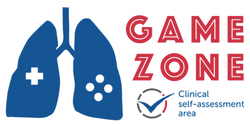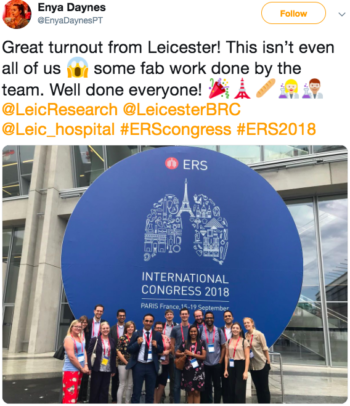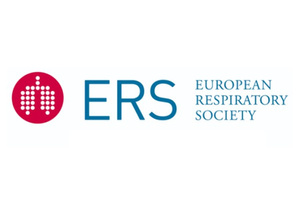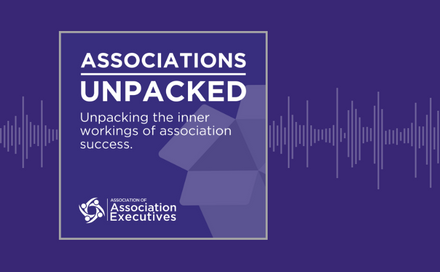ERS International Congress
Success achieved
Providing a platform for early career members to contribute to the ERS Annual Congress.
- Website
- https://erscongress.org/about-ers-2018.html
- Project dates
- December 2017 – September 2018
Project team
- Carine Pannetier, Director of Education, Events, Programmes and Accreditation
- Amy Farr, Educational Programmes Manage
Tools & Systems
ERS developed the online self-assessment platform using its existing learning management platform (Moodle) using in-house e-Learning experts.
Medical equipment and supporting learning programmes was supplied for free by several medical device suppliers.
The Clinical case submission platform was developed using the existing ERS event management database (Key4Events).
Introduction
The ERS international congress is the largest annual meeting in the field of respiratory medicine, with more than 20,000 delegates coming together from over 120 countries.
5-years ago, ERS identified the need to develop additional avenues for its younger membership base to engage in the society. As a first step, an early career members (ECM) committee was formed, within this framework an early career member was identified to support the work of each of the 14 ERS scientific assemblies, as well as the ERS Science, Education and Programme development committees.
The ECM committee has since become a very important source of feedback, brainpower and support in the development of the content for the annual conference.
This award application is in reference to the unique activities, notably the ERS Game Zone and the ERS Clinical Case submission and presentation process, that were developed by and for the ERS Early Career Members to:
- Increase the engagement of this group at the 2018 ERS International Congress
- Provide opportunities for younger congress delegates to present their work throughout the congress programme
Allow delegates to carry out self-assessment activities and learn in a less formal setting at the conference.
Discovery
As the ERS International Congress is an annual event, each year as part of the congress evaluation process, congress delegates are asked for their feedback on the congress programme formats and scientific content. This feedback is gathered from qualitative research (one on one interviews), quantitative research (all congress delegate and membership surveys) and expert group discussions (programme committee).
Two key factors were identified by younger delegates and include:
- More opportunities to develop hands-on clinical skills and
- A greater number of case-based sessions
Although, there are a number of these session types within the programme, there was often a charge to attend the clinical skills sessions, which poses a barrier for early career members who do not necessarily have access to the same level of funding or financial support that their more senior colleagues may have.
Objectives
Apart from the aims previously listed above:
- Increase the engagement of this group at the 2018 ERS International Congress
- Provide opportunities for younger congress delegates to present their work throughout the congress programme
- Allow delegates to carry out self-assessment activities and learn in a less formal setting at the conference
The following objectives were set:
- Receive at least 200 clinical case submissions
- 500 delegates visit the online self-assessment platform
- 1000 delegates visit the onsite clinical skills area
- Involve at least 20 early career members in the running of the onsite Game Zone
Timeline
- December 2017 – Game zone and case based developments concepts are discussed
- January 2018 – September 2018 – Online platform is developed/refined
- January 2018 – March 2018 – Case submission period is opened
- February 2018 – September 2018 – Early career members are recruited and trained
- March 2018 – June 2018 – Cases are reviewed and added into sessions
- June 2018 – September 2018 – Faculty are trained for the new session types
- April 2018 – Game Zone online content is checked by content experts
- May 2018 – August – Game stand is designed
- May 2018- September 2018 – Content is included in the online platform
- September 2018 – Congress takes place (cases presented, and Game Zone is live)
Activities
The Game Zone was with a hands-on area with individual work stations, which were connected to the ERS online self-assessment learning platform. Delegates were invited to use these stations to assess their knowledge around eight key areas of respiratory medicine.
The activities were prompting delegates to answer case and vignette-based multiple-choice questions covering the clinical spectrum; looking at the diagnosis, treatment and management of major respiratory diseases. In addition, there were some practical assessment areas available.
The Lungs on Fire sessions were built on the cases submitted in the open call and selected by the International Congress Programme Committee members. A panel of experts was put to the test against the audience to diagnose various selected clinical cases. The panel of experts was discovering the cases at the same time as the audience. Each session was led by a discussant, who was the only person in the room with the details about the cases. Participants answered multiple-choice questions throughout the session.
The aim was to give the audience an opportunity to study real challenging clinical cases, to learn and exchange ideas with a panel of respiratory experts and to discuss the various diagnosis and treatment options. These very popular sessions were open to all Congress delegates.
Innovation
The Game Zone is an innovation in respiratory medicine and will be used as a platform to build other new activities for the 2019 and future congresses.

Game zone logo
The new case based session type “Lungs on fire” involves a panel of experts being put to the test against the audience to diagnose various selected clinical cases. The panel of experts was discovering the cases at the same time as the audience. Each session was led by a discussant, who was the only person in the room with the details about the cases. Participants answered multiple- choice questions throughout the session.
The aim was to give the audience an opportunity to study real challenging clinical cases, to learn and exchange ideas with a panel of respiratory experts and to discuss the various diagnosis and treatment options.
Marketing
The marketing for these developments followed the ERS traditional marketing channels which includes:
- Social media, including a social media challenge linked to guessing the number of pieces in the “Lego lungs” displayed onsite
- ERS websites
- Newsletters

Stickers developed for the congress
In addition, a logo was created for the Game Zone that was displayed throughout the online platform, and at the Game Zone onsite.
Stickers were also developed and distributed to delegates that participated onsite to help raise awareness of this new congress feature.
Achievements
Delegates commented that although they were learning it was in a more fun and hands-on interactive format.

ERS International Congress
Aims:
- Increase the engagement of this group at the 2018 ERS International Congress - ACHIEVED
- Provide opportunities for younger congress delegates to present their work throughout the congress programme - ACHIEVED
- Allow delegates to carry out self-assessment activities and learn in a less formal setting at the conference - ACHIEVED
Objectives:
- Receive at least 200 clinical case submissions - ACHIEVED
- 500 delegates visit the online self-assessment platform - ACHIEVED
- 1000 delegates visit the onsite clinical skills area - ACHIEVED
- Involve at least 20 early career members in the running of the onsite Game Zone - ACHIEVED
Although, all the objectives were met, there were definitely some key learnings taken for the next congress for example: counting of delegates participating in activities, ease of use of the online platform, allowing anonymous delegates on the Game Zone...
Targets & Statistics
- Over 400 clinical cases were submitted by the respiratory community, these cases were integrated into existing case based sessions (challenging clinical cases and grand rounds) and a new session type “Lungs on fire” (LoF) was developed especially due to the high number of submitted clinical cases. The new LoF sessions were some of the most attended sessions at the 2018 Congress.
- 783 participants entered the online Game Zone platform onsite
- Over 1500 people interacted in the free clinical skills workstations
Financials
ERS invested approximately €30,000-€50,000 in these new congress features. Although there is not a direct monetary return on the investment, ERS has an obligation to its members and conference delegates to ensure that the congress remains interactive and engaging.
Wider impact
The impact for the association is that for a relatively low investment ERS is staying at the cutting-edge of respiratory medicine education.


